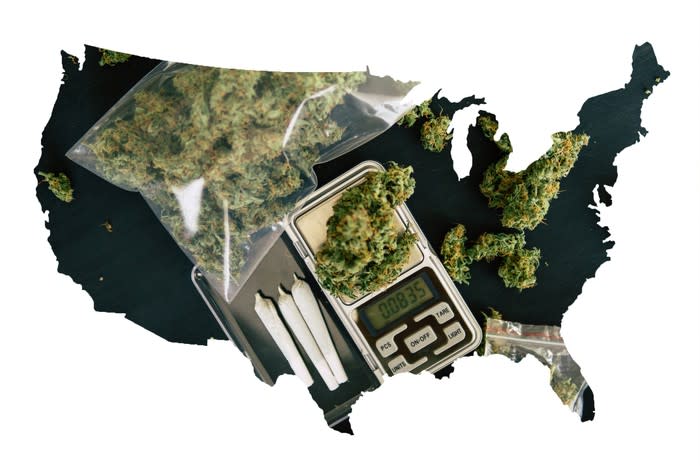U.S. Marijuana Sales Will Be 12 Times Higher Than Canada by 2024, Report Shows
It's no secret that the legal marijuana industry is expected to grow like a weed over the next decade. The big question continues to be, "By how much?"
Last week, marijuana market insights and strategic consultancy company Prohibition Partners attempted to answer this question by releasing a free 117-page report aptly titled "The North American Cannabis Report." Prohibition Partners' report focuses specifically on the crown jewels of the cannabis movement: the United States and Canada.

Image source: Getty Images.
Canada became the first industrialized country in the world to legalize recreational marijuana in October 2018. Though it may not be the most populous nation, it's essentially laying the groundwork that other developed countries could choose to follow with regard to regulating a legal cannabis industry.
Then there's the United States, which should be the runaway leader in marijuana sales. Although the federal government has held firm on its classification of pot as a Schedule I substance -- meaning it's entirely illegal, is prone to abuse, and has no recognized medical benefits -- it hasn't stopped 33 states from legalizing medical marijuana and 11 states from passing legislation on recreational weed use and/or sales.
The U.S. is the King Kong of cannabis
So, what did Prohibition Partners have to say about the North American cannabis industry? Let's dive into some of the more intriguing findings.
First, there's the headline number of $47.3 billion in estimated sales potential by 2024. This is up from an estimate of $17.1 billion in North American sales as of 2019, representing a 177% increase. On a compound basis, we're talking about a 22.6% growth rate per year. Of course, it could be more, with the report noting that the true value of legal weed sales is tough to calculate given the persistent presence of black market operators. Depending on how well the legal industry eradicates the black market, North American sales could come in even higher.
But there's far more of note here than just Prohibition Partners' call for 177% North American sales growth. Maybe most notable is what percentage of total sales will be derived from the U.S. market. According to the report, a mere $3.4 billion in sales will come from Canada by 2024, with the United States responsible for the remaining $43.9 billion. Put another way, the U.S. pot industry is forecast to be about 12 times as important as the Canadian weed industry, by these sales estimates. Keep in mind, though, that these estimates assume full legalization of cannabis in all 50 states by 2024.

Image source: Getty Images.
Also off the beaten path is the report's prognostication that medical cannabis sales will continue to outpace recreational marijuana revenue by 2024. Prohibition Partners believes that medical cannabis revenue will total $25.2 billion, with adult-use marijuana sales of $22.1 billion. Most analysis from Wall Street suggests that recreational sales will leave medical weed in the dust, but that'll largely depend on the pace of legalization throughout the United States.
Lastly, and more consistent with other industry reports, Prohibition Partners expects cannabidiol (CBD) lifestyle products to deliver "unprecedented expansion," and anticipates further dealmaking from brand-name vice, food, and beverage companies as they look to take advantage of rapid growth in the cannabis industry. CBD being the nonpsychoactive cannabinoid best known for its perceived medical benefits.
U.S. pot stocks can't be ignored
Regardless of whether this report, or the numerous others that have been previously released, proves the most accurate, one consistency continues to be that the United States is going to absolutely dominate in terms of annual weed sales. That makes it a market investors simply can't ignore.
The good news is that there are a lot of ways to play the burgeoning U.S. pot industry.
As the report notes, the rise of CBD is expected to be a significant growth driver for the U.S. market. That should put Charlotte's Web (OTC: CWBHF) at the center of a major growth trend. You see, despite the CBD market being highly diversified, Charlotte's Web is currently the market share leader with access to over 8,000 retail doors. In late July, Charlotte's Web nabbed another national partner when Kroger agreed to carry an assortment of CBD topicals in 1,350 of its stores in 22 states. Perhaps it's no surprise that Wall Street is looking for 81% sales growth in 2019 and 140% revenue growth in 2020 for the company.

Image source: Getty Images.
Investors could also take advantage of rapid CBD growth by focusing on extraction. In July, Neptune Wellness Solutions (NASDAQ: NEPT) closed on its $18 million cash-and-stock deal to acquire privately held hemp and cannabis biomass extraction-services company SugarLeaf. By the end of 2019, SugarLeaf is expected to have an annual run-rate extraction capacity of 1.5 million kilos in the U.S., making it a significant third-party contractor for targeted cannabinoids like CBD. It's also worth pointing out that Neptune Wellness Solutions has 200,000 kilos of annual run-rate extraction capacity in Canada that's mostly booked out over the next three years, thanks in part to big deals with The Green Organic Dutchman and Tilray.
Cannabis investors might also consider vertically integrated multistate operators, such as Curaleaf Holdings (OTC: CURLF). Curaleaf looks set to become the first marijuana stock to hit $1 billion in annual sales in 2020. This comes after the company acquired Cura Partners and its well-known Select brand, then offered $871 million in a cash-and-stock deal to buy Grassroots. Assuming the latter purchase closes, it'll nearly double Curaleaf's existing retail licenses, expand its presence to 19 states from 12, and cement its lead as the multistate operator with the most open locations.
The point is that if you want in on the green rush, you'll need to be looking at and/or adding U.S. pot stocks to your portfolio.
More From The Motley Fool
Sean Williams has no position in any of the stocks mentioned. The Motley Fool recommends Charlotte's Web. The Motley Fool has a disclosure policy.
This article was originally published on Fool.com

 Yahoo Finance
Yahoo Finance 